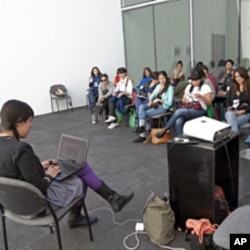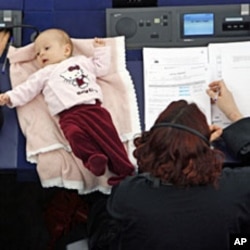Western Europe includes some of the most progressive democracies in terms of women’s rights, with Iceland, Finland, Norway and Sweden leading the World Economic Forum’s list of countries with the greatest equality between men and women. An egalitarian political culture and family-friendly policies have enabled Nordic and Scandinavian countries to reverse declining birthrates that continue to drop in other parts of Europe where women are faced with more stark choices between career and family needs.
One of the most telling signs of gender equality, according to Muriel Rouyer, Visiting Professor of Public Policy at Harvard University, is how a country treats women and maternity. She says the European Union (EU) greatly reduces the consequences of childbearing because of its declared commitment to gender equality and its recognition that maternity should not impede participation in the labor market.
Western European gender data
"[It is] the duty of the community or society to pay for that because it is acknowledged that women create a kind of resource for the country and ... they should not be penalized by that," said Rouyer, who is on loan from the French University of Nantes.
Swedish expatriate Elisabet Baldwin, founder and owner of www.ebconnects.co.uk, a networking and business support company in Britain, says in an email interview that Swedish society expects parents to take leave and makes it possible for them to do so up to a year.
In Britain, where Baldwin says she was expected to be a “non-working stay-at-home mum,” child and home care fall mostly “on the woman’s shoulders,” which means many women have to go to “extreme lengths of ingenuity to organize practical workable childcare.”
In the case of Germany, Rouyer says mothers traditionally stop working for three years and keep their kids at home. Women who continue to work while raising children run into cultural stigmas.
“And it's very badly configured if you have a child and you go to work. There is even a word to designate those bad mothers ... Raven Mothers," [a reference to old legends claiming that the black bird pushes its chicks out of the nest] Rouyer explained. "So these parents have kids and try to work, and it's very difficult."
As a result, many women drop out of the workforce or work part-time. Many German women, for example, work less than 20 hours a week, while in the Netherlands, where Hegewisch says not working or working full-time while caring for children is unacceptable, Dutch women hold three out of four part-time jobs, the world's highest proportion, according to the Organization for Economic Co-Operation and Development (OECD).
The downside is that the longer women work part-time, the harder it becomes for them to find full-time jobs or build careers. Many, according to Arianne Hegewisch, Study Director at the Institute for Women's Policy Research in Washington, are “trapped in the secondary labor market,” occupying marginal jobs and earning less than men, or doing the bulk of unpaid work.
"Especially in responsible jobs - managerial/professional - the expectation is that you can work long hours,” said Hegewisch. “But if you need to work 60 hours or more to advance in your career, then it is very hard to also raise children, especially if you are married to a man who has similar working hours."
Swedish entrepreneur Heidi Harman, who founded a female health running community at RunAlong.se and co-founded GeekGirlMeetup.com, a website for women interested in the Web and business development says her chances of making a decent career would have faltered had she or her boyfriend chosen to have kids at an early age. But she goes on to say in an email interview, “It’s a mindset. “If want a career and kids, you make things work. It's like that for both women and men in Sweden.”
It’s a different story in Italy, where Hegewisch says few women work and those who do take on full-time jobs. "And what has happened in Italy is that women have ... voted ... with their bellies, or whatever - they don't have children any more ... So birth rates in Italy are very low."
"In [the] 1980s and in 1970s, the countries with the highest fertility rates were the countries with the lowest female employment rates," said Willem Adema, Senior Economist with OECD's Social Policy Division in the Netherlands. "Nowadays, the countries with ... the highest female employment rate are also the countries with the highest fertility rates. So, what is happening is that those countries, which somehow managed to ... give a lot of parents the feeling that they can reconcile work and caretaking - that these countries have the highest fertility rates."
Adema says women in Spain and other countries where fertility rates are low "often have to make a choice between following a career and having children, whereas that choice ... in Scandinavian countries or in the Netherlands is far less stark."
Rouyer agrees. She points to France, Sweden and the Nordic countries as examples of countries with high fertility rates and high female participation in the labor force.
"Why?” Because there exist very good public policies to conciliate or balance ... work life and family life - meaning cheap daycare,” Rouyer said.
“You can put your child in ecoles maternel, which are pre-school and it's free and it lasts from 8:30-4:30 ... so you can work all day and you don't have to pay anything for that except for the lunch at noon," Rouyer said.
U.K. blogger and feminist Emma Sheppard says in an email interview the biggest problem women with kids complain about is that childcare is expensive. “So unless you can find a job that’s really flexible, or have family members who can help, you have to choose between paying a lot of money for childcare [sometimes too much to make working practical], or having a single income, which assumes a two-parent family where one parent can afford to stay home,” said Sheppard.
Women have been pushing for remedies for some of these issues, both as political candidates and policymakers. “And you can see a clear link between having a high proportion of women in parliament or as ministers in local government, and getting the kind of laws and provisions that help women,” said Hegewisch.
Women in EU member states can appeal to the European court those cases overturned by courts in their own countries, although Sheppard says the EU should be more serious about enforcing its gender equality laws.
“Instead we get a lot of talk, but not a lot of action – and it’s up to the individual countries to choose whether or not they fall in line, and to what degree, and how they put it [i.e., gender equality laws] into action. Instead it’s up to individuals to take things up, to go to court and kick up a fuss,” said Sheppard.
It is also up to individual countries to tackle the factors that contribute to their declining birth rates. Recent figures from Germany, Europe's largest economy, show that the country has some of the lowest birthrates in the region, with a drop of nearly 7,000 live births between 2007 and 2010. Italy faces a similar decline. And unless these countries reverse the fertility curve, as France, Spain and others have done, their aging populations will have bigger problems to contend with in the long-term.









